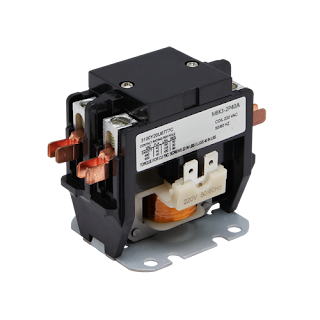An
air conditioner contactor is the
heavy duty industrial equivalent and in factory and industrial applications it
is a standard component. Compared to relays contactors are somewhat more rugged
and are designed to easily mount on a standard DIN rail. Few of them have additional
mounting holes that allow them to be directly bolted to a flat surface. They’re
designed in a way so that they can switch high loads such as large heating
loads, fractional and multiple horsepower, multiphase motors; and
industrial/commercial lighting. Consequently, contactors are designed so that
it can accept large, high current wires.
Contactors
that are designed to be driven by a PLC have 24 volt DC solenoid coils, but
coil drive ratings for AC line voltages are also common.
As
with relays, an plunger or actuator that physically makes a connection between
one or more pairs of the contactor’s heavy duty electrical contacts is
attracted magnetically by electromagnetic solenoid coil of a contactor. Making
it easy to change out the solenoid coil to change voltage, contactors are
assembled in a modular fashion unlike relays. In a modular fashion, Relays are
generally not constructed and replacing the entire relay is usually needed by changing
a relay’s configuration generally. Modifying the array of actuated contacts is
allowed by the modular construction of rheemair conditioner contactor.
Multiple sets of contacts are present in the Contactors usually. high current contacts is incorporated by a contactor will only Sometimes, but a mix of low and high current contacts used for simultaneous switching of power and signal circuits, respectively are present in contactors. An auxiliary contact is also low current contact. To carry the higher load current, high current contacts are physically larger than the low current contacts. This is the difference between the two types of contact.
The life of the Goodman ac contactor can be extended by specifying a contactor with heavier current carrying capability as compared to absolutely needed when it is placed in service as contactors handle high voltages and high currents. Due to their thicker plating and beefier construction, larger contacts will not pit as much from actuations. Follow us on Facebook






No comments:
Post a Comment